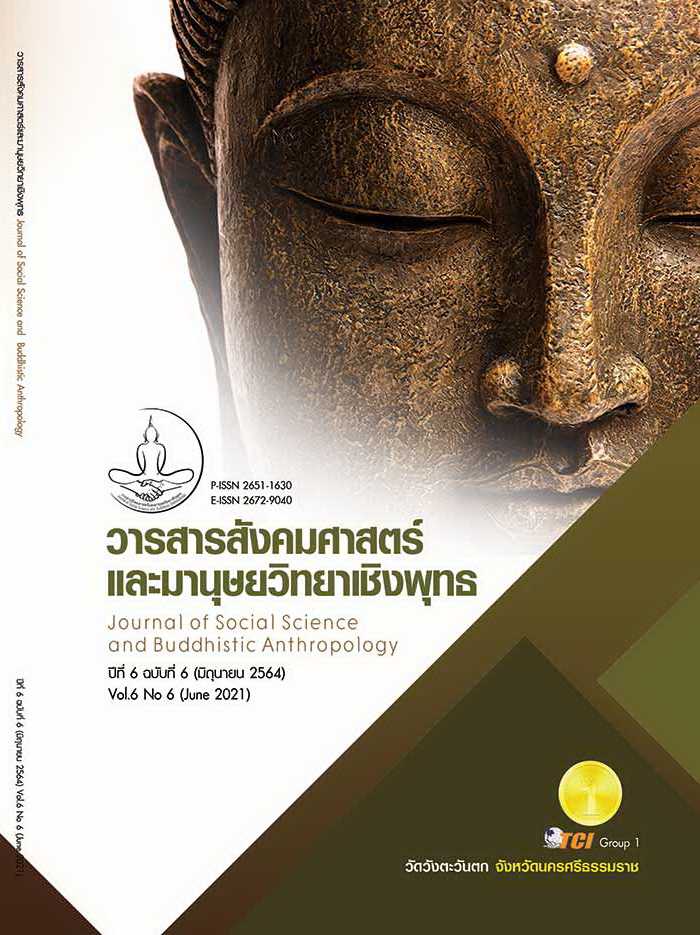ENHANCING POTENTIAL OF COMMUNITY STRENGTHENING BY RESEARCH AND INNOVATION
Keywords:
Potential, Community Strengthening, Research and InnovationAbstract
The objectives of this research article were to Evaluate the Potential of Community Strengthening by Research and Innovation. This study was an Action Research utilizing the mixed methods of qualitative and quantitative approach. The sample included 269 communities selected from The Sufficiency Economy and New Theory of Agriculture Distric Learning Center all over the country. Data were collected using 5 dimensions of community strength of self - assessment, and analyzed by descriptive statistics of frequency and percentages. Qualitative data were collected using participant observation and analyzed by inductive content analysis, also using TERMS Model as the main idea to explain. The results were The Potential of Community Strengthening were enhanced through research and innovation in every project indicated: 1) The infrared rotary dryer raised the economic dimension from medium to strong level. 2) The innovation of Automatic Mushroom Cultivation Cabinet raised the mean level from strong to the strongest level, the learning dimension from strong to the strongest level, the economic dimension from low to medium level and the public sector development dimension from strong to the strongest level. 3) Parabolic Greenhouse Solar Dryers raised the mean level from strong to the strongest level, the learning dimension from strong to the strongest level and the economic dimension from medium to strong level. 4) Solar Pump for Social Communities raised the learning dimension from strong to the strongest level and the economic dimension from medium to strong level and 5) Wood Vinegar Distillery technology raised the mean level from strong to the strongest level, the learning dimension from strong to the strongest level and the economic dimension from strong to the strongest level. The results showed that the communities supported by knowledge from research and innovation were development in the technological self - reliance component and enhancing potential of community strengthening. All were successful from “C3 - SPERIT Model”
References
กรมส่งเสริมวัฒนธรรม กระทรวงวัฒนธรรม. (2558). วัฒนธรรม วิถีชีวิต และภูมิปัญญา. กรุงเทพมหานคร: กระทรวงวัฒนธรรม.
กองบริหารงานวิจัยและประกันคุณภาพการศึกษา สวทช. (2560). พิมพ์เขียว Thailand 4.0 โมเดลขับเคลื่อนประเทศไทยสู่ความมั่งคั่ง มั่นคง และยั่งยืน. เรียกใช้เมื่อ 25 กันยายน 2563 จาก https://waa.inter.nstda.or.th/stks/pub/2017/20171114-draeqa-blueprint.pdf
จรูญ จันทรตะกอง. (25 มิถุนายน 2563). การสื่อสารส่วนบุคคล. (ชญาดา เข็มเพชร, ผู้สัมภาษณ์)
ชญาดา เข็มเพชร. (2559). การพัฒนาผู้นำต้นแบบในสังคมไทย. ใน ดุษฎีนิพนธ์พุทธศาสตร์ดุษฎีบัณฑิต สาขาวิชารัฐประศาสนศาสตร์. มหาจุฬาลงกรณราชวิทยาลัย.
บุญแทน เหล่าสุพระ. (3 กรกฎาคม 2563). การสื่อสารส่วนบุคคล. (ชญาดา เข็มเพชร, ผู้สัมภาษณ์)
บุษราภรณ์ พวงปัญญา และภักดี โพธิ์สิงห์. (2560). ศูนย์การเรียนรู้เพื่อการพัฒนาชุมชนท้องถิ่น. ธรรมทรรศน์, 17(1), 193-203.
พรชัย พรหมรำไพวงศ์. (19 ธันวาคม 2563). การสื่อสารส่วนบุคคล. (ชญาดา เข็มเพชร, ผู้สัมภาษณ์)
เพ็ญประภา ภัทรานุกรม. (2560). บทที่ 6 วิจัยเพื่อท้องถิ่น: บทบาทมหาวิทยาลัยในการขับเคลื่อนการพัฒนาชุมชนอย่างยั่งยืน. วารสารร่มพฤกษ์มหาวิทยาลัยเกริก, 35(3), 138-145.
วุฒิชัย สายบุญจวง. (2561). ชุมชนเข้มแข็งในทัศนะของชาวชุมชน กรณีศึกษาบ้านปลายคลองบางโพธิ์เหนือ หมู่ที่ 3 ตำบลบางโพธิ์เหนือ อำเภอสามโคก จังหวัดปทุมธานี. วารสาร วไลยอลงกรณ์ปริทัศน์ (มนุษยศาสตร์และสังคมศาสตร์), 8(1), 119-129.
สถาบันเพื่อสร้างความเข้มแข็งให้ชุมชน มหาวิทยาลัยนเรศวร. (2552). โครงการวิจัยเพื่อรวบรวมผลการดำเนินโครงการของหมู่บ้าน/ชุมชนที่ต้องการปฏิบัติการที่ดี (Best Practice) ในการบริหารจัดการโครงการตามแนวปรัชญาเศรษฐกิจพอเพียง. พิษณุโลก: ทิพย์เสนาการพิมพ์.
สมพาน นุสีวอ. (18 กรกฎาคม 2563). การสื่อสารส่วนบุคคล. (ชญาดา เข็มเพชร, ผู้สัมภาษณ์)
สุริยา ขันแก้ว. (25 มิถุนายน 2563). การสื่อสารส่วนบุคคล. (ชญาดา เข็มเพชร, ผู้สัมภาษณ์)
อรรถ สุขขะ. (7 มีนาคม 2563). การสื่อสารส่วนบุคคล. (ชญาดา เข็มเพชร, ผู้สัมภาษณ์)
Buzan, B. et al. (1999). Security: A New Framework for Analysis. American Political Science Review, 93(4), 1010-1011.
Mani, A. et al. (2013). Poverty Impedes Cognitive Function. Science, 341(6149), 976-980.









